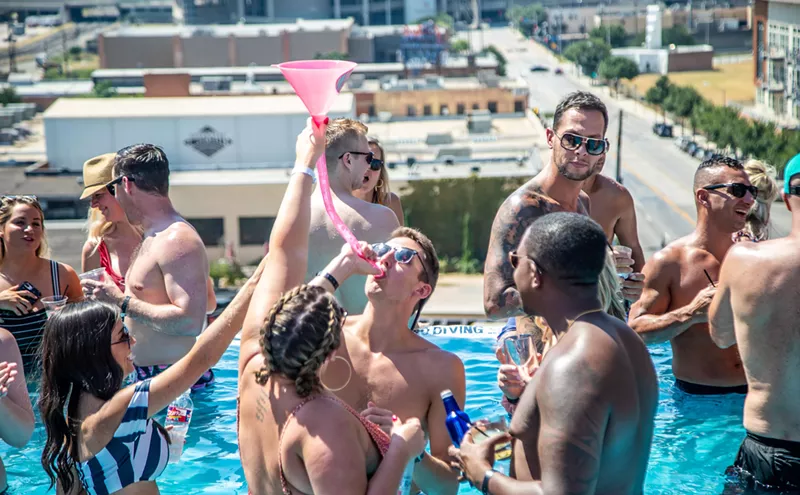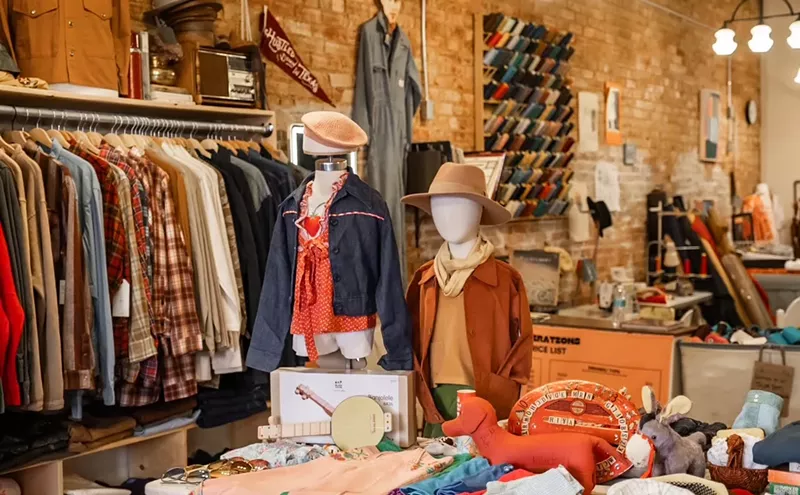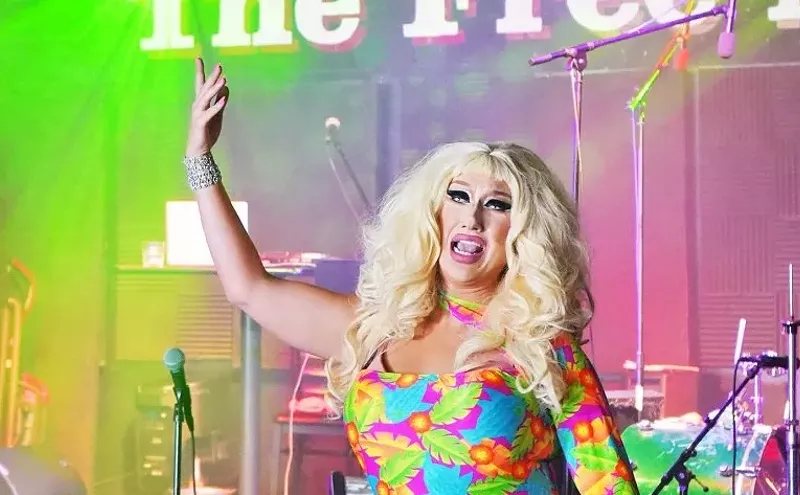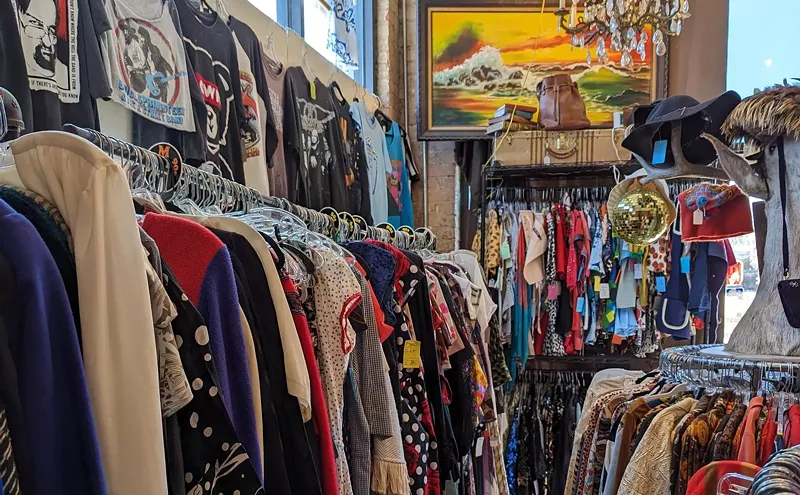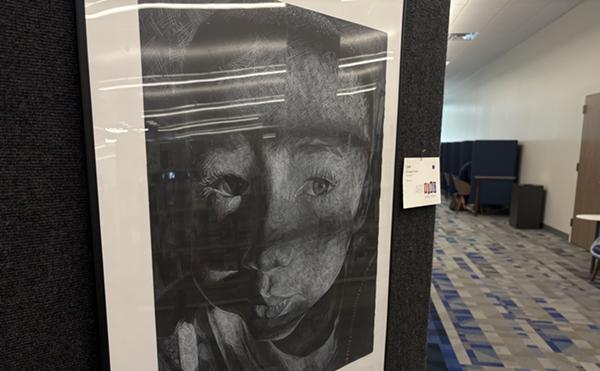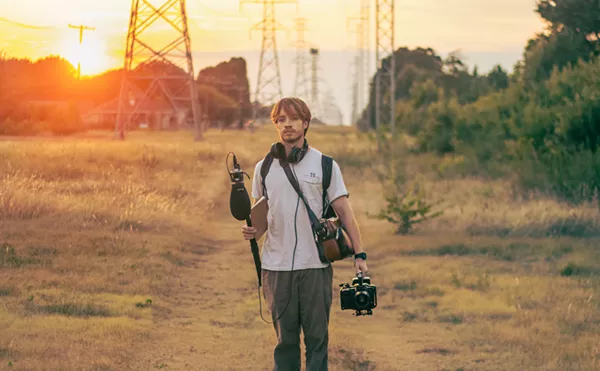For the first time in years, Robertson was sitting through the entirety of The Last Waltz, the Martin Scorsese-directed adios recently dusted off and polished up for re-release--in theaters this month, followed by a DVD come May. Till that night in Austin, he'd seen little of the film he produced and instigated; every so often he'd come across it on television and keep on cruising right past it. "I would say, 'Oh, God, look, they're showing The Last Waltz,'" he says now, "and it just wasn't the time or place for me to sit there and watch the whole thing." Last month in Austin, it was the right time and the right place. Mostly, he wanted to check the restored sound, which he supervised, and see how it played in a theater; maybe he even wanted to spend a couple of hours up there with dead friends and old ghosts he'd never see again.
Further pushing the night into weird-shit territory was an audience that applauded after every song and gave a standing ovation before the last notes of The Last Waltz had begun to fade. "It was like, holy smokes," Robertson says a few days later, his deep, raspy voice full of genuine delight and surprise. "I love the idea that people could get lost between the audience that was at the concert and the audience in the movie theater. It all started to feel like it became one, in a way. That's pretty extraordinary. I've never had that experience before."
Through some specious math equations, this is supposed to be the 25th anniversary of The Last Waltz, which was filmed on Thanksgiving Day 1976 and released in 1978; perhaps this is the 25th anniversary of the movie's editing. Even so, it's an occasion rife with hoopla: Not only is MGM/UA putting the film in theaters and releasing the DVD, complete with outtakes and two commentary tracks, but Rhino Records this week is issuing a four-disc boxed set containing the original 30 tracks and 24 oft-bootlegged outtakes. And Robertson has been working like hell to promote the sucker: Everywhere one turned during the South by Southwest Music Conference last month, there he was--delivering a keynote speech that recounted the history of The Band (after which you felt as though you lived through every day of those 16 years), catching Norah Jones' showcase at a local Indian restaurant, attending a showcase by a band he helped sign to DreamWorks Records, giving a speech before the screening.
He's often said he's not fond of backward-glancing; the past is just that and, far as he figures, not worth a second look. After The Last Waltz, he would never again perform with his old pals Levon Helm, Richard Manuel, Rick Danko and Garth Hudson, and he never will: Manuel hanged himself in 1986 after a concert by an atrophied version of The Band, and Danko died in his sleep 13 years later. Working on this project was "sad sweet," Robertson insists. "I wouldn't say bittersweet, but, you know, there's definitely a sadness to think, you know, that I'll never be able to talk with Richard or with Rick again."
But after years of making albums that sounded like a conscious effort to distance himself from The Band's sepia-tinted sound--as though they were Civil War soldiers trapped in a time warp and landed in Woodstock in 1968, with electric guitars in hand--Robertson spent long hours for many months working with Scorsese to buff up The Last Waltz. The director oversaw the picture, the songwriter retooled the sound, and the result is magical--the end of an era made more viable now than perhaps it was upon initial release. After all, back then audiences might have taken The Band--and its guests that night in San Francisco, from Bob Dylan to Neil Young to Van Morrison--for granted; they were everywhere and, it seemed, not going anywhere. Today, with the exception of Dylan and perhaps Young, they've been done in--by time (which claimed Muddy Waters and Pops Staples), maybe even by themselves. Robertson figures we need to be reminded of their importance; and maybe they do, too.
"I wanted to get this in as beautiful a place I can, visually and sonically, to pass it on to people that weren't around then, just so they can see this particular period of time and these artists," Robertson says. "Maybe they can have a little bit more understanding about those times and how potent those times were. I mean, when you look at these artists that are in The Last Waltz, and whether we're talking about the filmmakers or the guest artists or The Band or any of them, it was all at a level where someone had raised the bar real high years ago. And for a lot of these people, whether it be Joni Mitchell or Muddy Waters or Bob Dylan or Neil Young or Van Morrison or whoever, they're still unchallenged, you know?...Mainly, this is to pass the baton on to younger generations, 'cause they're saying, 'Oh, what's all the fuss about?'"
The way Robertson tells it, The Last Waltz was hatched when The Band--as a collective unit, to the man--decided it had come time to hang it up. They'd spent almost 20 years on the road, first as The Hawks backing up Ronnie Hawkins in shitholes throughout Canada and the United States, then as The Band. Album sales were slumping, audiences were growing restless, punk was about to dissipate all those old farts like a strong gust of wind--it was either retreat to the studio or turn into an oldies act, schlepping the shit to people who only wanted to hear "The Weight" or "The Night They Drove Old Dixie Down" or "Up on Cripple Creek" night after night after loathsome, lonesome night.
In 1976, keyboardist-singer Richard Manuel had injured his neck in a boating accident in Austin, and Robertson (at the time, a brand-new father) was growing superstitious about touring. Something was just wrong, Robertson kept telling Helm, the Arkansas hellion who sang like a roadhouse angel. "The numbers," Robertson insisted, "don't add up anymore."
So Robertson started planning a last hurrah during the fall of 1976--a goodbye from the very place where The Band first performed under that name, at the Winterland in San Francisco. He wanted to invite everyone with whom they'd played or were friends, from Hawkins to Dr. John to Van Morrison to Neil Young to, of course, Dylan. "It was gonna be the concert of the century, maybe the show to end the whole so-called rock era," Helm wrote in his 1993 autobiography This Wheel's on Fire, perhaps the most bitter eulogy ever penned. "That's what they told me, anyway. The only problem was, I didn't want any part of it." Which never hurt the performances: Helm, in particular, was thrilling that night, singing old songs as though he just learned them the week before; he wasn't just mumbling "Dixie" at the Winterland.
Nonetheless, since The Last Waltz, Helm and Robertson--once partners if not more, as it was the Arkansas boy who led his Canadian friend down the Delta to discover the birthplace of the blues when they were kids--have not spoken. Helm would accuse Robertson of a lot of things: stealing royalties from the other Band-mates, taking credit for songs he didn't write, even lip-synching songs in The Last Waltz. Helm, who's still touring despite having had throat cancer surgery some time back that has left his once-powerful voice a sad and raspy echo, agreed to participate on a commentary for the DVD--but he and Hudson have been banished to a track containing remarks from critic Greil Marcus and other participants. Robertson and Scorsese have their own, leaving them plenty of room to tell the story without outside interference.
"We don't get any royalties for The Last Waltz," Helm said when I spoke with him four years ago, around the time the withered Band released Jubilation. "That's the biggest rip-off that ever happened to The Band. I ain't kidding you...You thought us being white maybe we didn't get fucked as bad? Hey, let me tell you something, son. A nigger's a nigger to these motherfuckers. It got nothing to do with color. It was Robertson and Scorsese"--Helm pronounced it "Score-eatzi"--"and that fucking crowd of thieves that got paid for The Last Waltz, and they still get paid, I guess. I've never gotten a check for it in my life."
Robertson has plenty of other things to work on, besides The Last Waltz; he's signing bands to DreamWorks, helping Scorsese score Gangs of New York and working with Steven Spielberg on music for his next film. And, he says, he will begin working on another Band boxed set that will fill in the copious blanks left by the 1994 collection Across the Great Divide. The next one, he says, will be "the real, definitive collection--a fan's boxed set--because I'm thinking, this is my work, and if I don't take care of it, who the hell will? I don't have any choice in the matter."
It's almost surprising, in a way, he'd want to reopen these wounds--to answer questions about Levon, to step backward after so many years of sprinting forward with albums laden with techno blips and sampled bits.
"But there's nothing to heal from my point of view," he says. "I don't have any problems with any of it. I'm just really proud of the work, I'm proud of the people, I'm extremely proud to have been affiliated and been able to do what we had to do. And life's too short, I just can't live...I can't live." He pauses, then begins again. "I don't have time for this shit, I sure don't have time for that shit, you know what I mean? I don't know how to go there even. And I completely wish Levon all the best, and I hope that something works out for him and his health is OK and all of those things, but that's about it for me."



